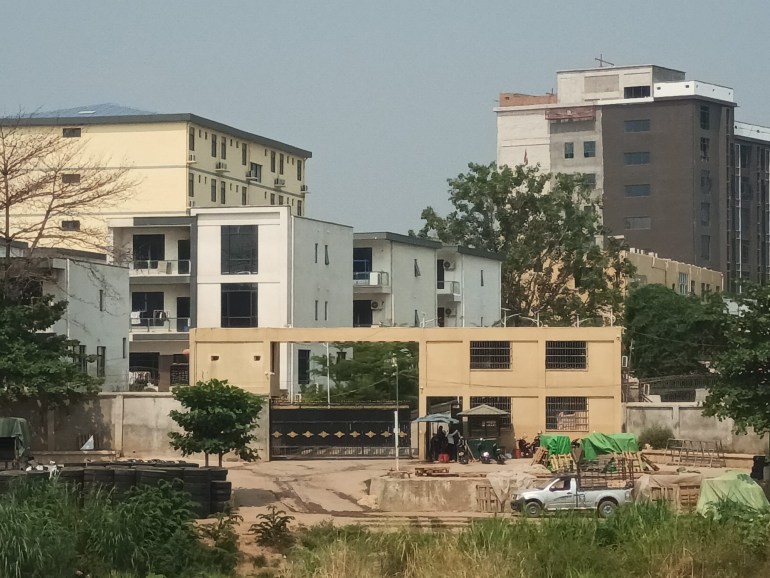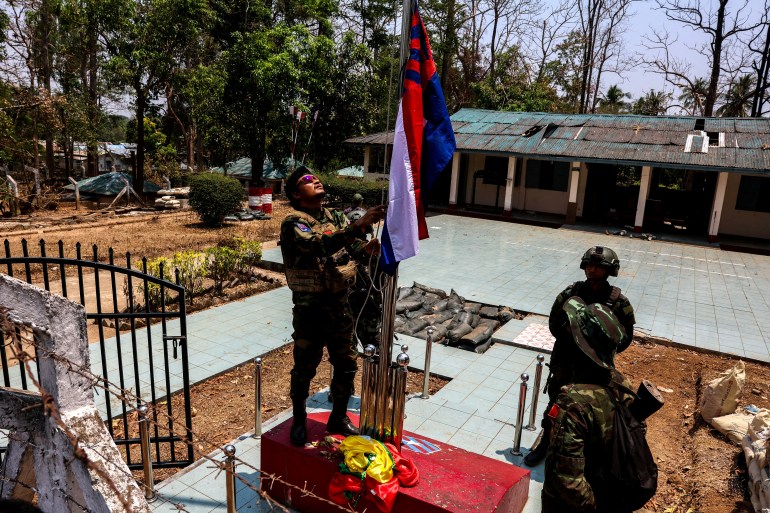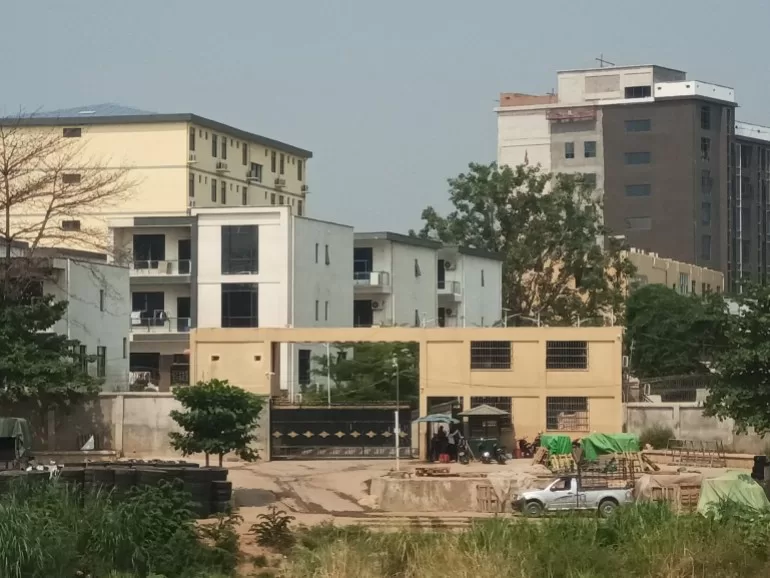The KNU immediately claimed a successful offensive, sharing photos of its troops at the entrance to the city. Although the KNU did not definitively claim they had taken the town, many thought Myawaddy had been fully liberated by the forces fighting against the generals who seized power from the elected government in a 2021 coup.
But the situation was not quite as it seemed.
Just two weeks after the KNLA took control of the base, the Myanmar military was back, sharing a picture of its soldiers raising their flag back at the site in a sudden and surprising turn of events.
Interviews with Myawaddy residents, sources close to the offensive and analysts indicate the KNLA never took the entire town. Rather, Myawaddy was under the control of the Border Guard Forces (BGF), a notorious militia operating in the border areas that are home to the ethnic Karen, Myanmar’s second largest ethnic group. And at the heart of the incident is Colonel Saw Chit Thu – an ethnic Karen strongman who leads the BGF with thousands of armed men under his command.
“Myawaddy was never captured by the KNLA. While the junta’s remaining troops from the 275th LIB retreated, the BGF army took control of Myawaddy and Saw Chit Thu stated that they would remain neutral to avoid conflict within the city,” a source close to a Karen ethnic armed group told Al Jazeera, requesting anonymity for fear of reprisals.
“During the capture of the 275th LIB, the BGF troops facilitated the transfer of junta troops from their base to the 2nd Friendship Bridge. Although the KNLA forces were permitted to enter the city, they were not authorised to occupy it, or target any of the junta’s administrative buildings within the city.”
The claim was corroborated by four different sources and analysts with deep knowledge of the incident.
Myawaddy is one of Myanmar’s largest cities with a population of more than 200,000, and occupies a crucial position on the Thai-Myanmar border through which billions of dollars of trade have passed for decades. Its apparent fall suggested a significant breakthrough for those fighting against the generals following the successes of Operation 1027, a major offensive launched by a coalition of other ethnic armed groups last year.
But when the Myanmar military made threats to destroy the town from the air and attack Shwe Kokko, a district just north of Myawaddy and the heart of Saw Chit Thu’s criminal empire where scam operations are rampant, he chose to allow the military to retake their base to entrench his power and profits.
“It became clear that the BGF had been playing both sides and that it ultimately pivoted to assist the military regime, leading to the photo op of the Myanmar flag once again being raised over the base,” Jason Tower, the Myanmar director of the United States Institute of Peace (USIP) told Al Jazeera.
Saw Chit Thu is a veteran fighter and was once the commander of the Democratic Karen Buddhist Army (DKBA) Battalion 999, a military-linked group that split from the KNU in 1994. Since then, he has become one of the most feared figures in Karen State and has worked closely with the Myanmar military.
Experts say the group has been actively involved in burning down villages to support the Myanmar army and even bombing camps housing displaced people.
“The real winner here has been the BGF, which has managed to protect its criminal enterprises and expand its control areas as a result of the fighting,” Tower said.
The criminal strongman
At the Dragon Casino in Myawaddy, a BMW pulls up to a huge black gate surrounded by tall concrete walls topped with razor wire. The security guards guarding the “entertainment complex” rush out to meet the men sitting inside and, after a cursory inspection of the boot, wave the vehicle through with a quick salute.
Along the Thaungyin River, casinos like these are popping up everywhere. At least five newly-built compounds are clearly visible from Thailand along the banks of the river that marks the border with Myanmar.
Some have moved into the area since anti-coup forces in northern Shan State advanced and began cracking down on criminal operations there.
According to a new report from the US Institute of Peace (USIP), the development of venues like these, which are largely Chinese controlled, has taken place with the blessing of Saw Chit Thu. His soldiers offer protection for a cut of the Chinese syndicates’ rising profits, which some estimates put as high as $3 trillion a year.
But while the scam compounds have turned Myawaddy into Myanmar’s new hotbed for criminality, analysts say they were not the only issue at play during the recent events in the town.
“It definitely wasn’t the BGF who was the main actor, but it definitely made a difference,” said Kim Jollife, an independent researcher with more than 15 years working on Myanmar.

According to Jollife, the BGF provides front-line support and intelligence to the military, and brings in food, water and fuel. Once they withdrew that support from the military, it was easier for the KNLA to move forward to take the military bases both on the outskirts of the city and beyond.
After the KNLA captured a range of heavy artillery, the pressure was enough for Battalion 275 to surrender.
“We don’t know exactly what happened, or why it all turned back,” Jollife said. “But there are two broad theories: One is that Saw Chit Tu is playing games, and that he’s trying to extract the best possible conditions he can from both sides. Both sides feel like they need him, so he’s able to play this game where he’s trying to extract certain guarantees.”
Saw Chit Thu and a military government spokesperson did not respond to calls from Al Jazeera seeking comment.
Jollife’s other theory is linked to disputes in the ranks of the BGF. Some top brass in the militia are rumoured to want to maintain allegiance to the generals, while others are more enthusiastic about supporting the KNLA. It remains unclear where Saw Chit Thu stands, but Joliffe says it is safe to say he leans whichever will best prop up his personal economic interests.
Myawaddy, he stressed, was “still far from under junta control,” and the situation was “in a very delicate balance.” He notes that the KNLA has in recent weeks captured three other key military bases not far from Myawaddy.
“The Myanmar military has not been able to bring in any significant new forces… It’s not like they’ve just retaken Myawaddy completely.”
Fear of reprisals
Since 2021, throughout Southeast Asia, Chinese criminal enterprises have expanded their scamming operations with tens of thousands trafficked into working for them.
Inside the scam compounds, workers are compelled to conduct romance scams or “pig butchering” scams, during which scammers “build trust” with their targets over time, only to ultimately betray them and make off with their money. Many of the scams take place under the threat of violence or death for those forced to work inside the compounds.
“Chit Thu’s BGF is the muscle to enforce the will of the Chinese criminals who run Shwe Kokko as a sin city with scamming, trafficking, gambling and prostitution,” Phil Robertson, the Bangkok-based deputy Asia director of Human Rights Watch, told Al Jazeera. “He’s a cancer against the rule of law, good governance and human rights in Karen State, and ultimately will need to be dealt with, one way or another.”

There is an unmistakable sense of fear whenever discussing Saw Chit Thu with Myawaddy residents, largely because they know that the colonel has become wealthy through extortion and other strategies that prey on the people of Karen State.
The strongman was sanctioned by the United Kingdom last year for alleged human trafficking.
“It is so sad to see that the land of the Karen people is now turning into an area full of criminal groups and activities,” a leading Karen women’s rights activist, who could not be named for fear of reprisals, told Al Jazeera. It is a sentiment shared by many other ethnic Karen who live in the area, but also fear speaking out will put them in danger.
“The BGF has never helped us refugees,” a newly displaced woman told Al Jazeera from a hospital in Mae Sot, just across the border in Thailand. “I cannot say much more, but the KNU have always been there for us.”
With Myanmar’s trade routes, including those with China, India and Thailand, squeezed by resistance forces, the generals are doing all they can to regain full control of Myawaddy, the anonymous source said.
Thousands of people fled the fighting last month. But now, they may be facing a renewed assault.
“Operation Aung Zeya, involving reinforcement columns from the 11th, 44th, 55th, and 77th Light Infantry Divisions, is a nation-level operation aimed at retaking Myawaddy,” the unidentified source said of an impending new military offensive.
“As of April 29th, approximately 2,000 junta troops are en route to Myawaddy.”
